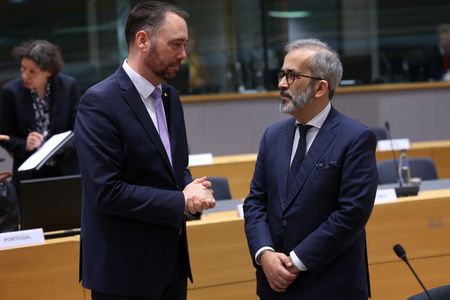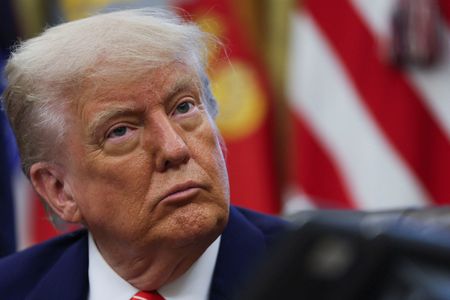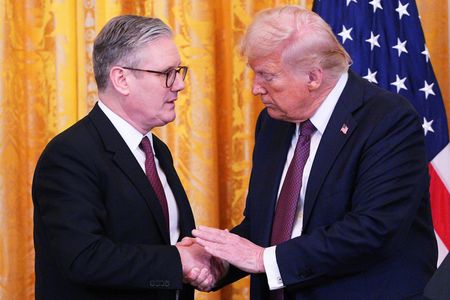By Elizabeth Piper and Yuliia Dysa
KYIV (Reuters) – Ukraine’s parliament voted on Thursday in favour of ratifying a minerals deal signed with the United States, an agreement Kyiv hopes will secure future military assistance from Washington in its fight to repel Russian troops.
Despite misgivings by some Ukrainian lawmakers over whether the government had provided them with all the information on the deal and over some of its compromises, 338 voted in favour of ratifying the agreement, with none against.
“The Ukrainian Parliament has ratified the historic Economic Partnership Agreement between Ukraine and the United States,” First Deputy Prime Minister Yulia Svyrydenko said in a post on X.
“This document is not merely a legal construct — it is the foundation of a new model of interaction with a key strategic partner.”
Some lawmakers had raised concerns over the lack of detail of some of the deal’s provisions, such as how an envisaged investment fund for Ukraine’s reconstruction would be governed or how any contributions would be made.
Svyrydenko called an early Thursday press conference to answer some of those concerns, saying the investment fund would be operational in a few weeks, and its success would depend on the level of U.S. engagement.
Two supplements would spell out the details and would be published at a later date, officials have said about the deal which might not see a payoff for a decade or longer.
Parliament’s ratification comes a day before Russia – which launched a full-scale invasion into Ukraine in February 2022 – will try to show its strength at a military parade to celebrate the 80th anniversary of the defeat of Nazi Germany.
Those preparations have been overshadowed by Ukrainian drone strikes on Russia, and Kyiv will hope the ratification of the minerals deal will bolster its position in ceasefire talks, which so far have done little to close the gap between Moscow and Kyiv, to the frustration of U.S. President Donald Trump.
Russia’s demands for Ukraine to cede all the land Russian President Vladimir Putin claims to have annexed and accept permanent neutrality have been rejected by Kyiv, which says that would amount to surrender and leave the nation undefended.
CEASEFIRE
Ukraine has expressed readiness to accept a U.S. proposal to enact an immediate, interim 30-day ceasefire, which could be extended by mutual agreement of the parties, and has accused the Kremlin of ignoring the plan. Putin has proposed a ceasefire of only three days – from May 8-10.
The minerals deal, signed last month in Washington, hands the United States preferential access to new Ukrainian minerals deals and sets up the investment fund, which could be used for the reconstruction of Ukraine for the first 10 years.
After months of fraught talks that almost fell apart at a disastrous meeting between Trump and Ukrainian President Volodymyr Zelenskiy in February, the deal also hands Kyiv some wins: no return of aid that Trump says Kyiv owes and a U.S. acknowledgement of Kyiv’s intention to join the European Union.
Ukraine also sees the deal as a route to unlock the delivery of new U.S. weapons, especially additional Patriot air defence systems it badly needs to repel Russia’s increasingly frequent missile attacks. The deal offered no clear guarantee of that.
The agreement, which Zelenskiy says offers Ukraine a better deal than previous drafts – which some in Kyiv had described as “colonial”, – is central to Kyiv’s efforts to mend ties with Trump after the Oval office meeting.
Some Ukrainian lawmakers praised the government’s efforts to influence Trump’s position, which initially appeared to favour Russia.
“Trump’s initial position is changing by millimetres, but so far its movement is in the right direction,” Inna Sovsun, a lawmaker from the Holos opposition party, said on Facebook, adding that while she might not like the deal’s “mercantile” nature, it was important to show that Ukraine is a “constructive party”.
Some 47% of Ukrainians support the deal, while 22% say it might have negative consequences and 19% say it will have no impact, according to researchers at the Kyiv International Institute of Sociology.
(Reporting by Elizabeth Piper, Yuliia Dysa and Anna Dabrowska; Editing by Gareth Jones)













